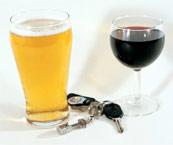Alcohol Abuse: Signs and Symptoms
If you are wondering if you have a problem with alcohol or are worried about how a family member, friend, and/or co-worker might be abusing alcohol, then you are taking the right steps.
Experts make a distinction between alcohol abuse and alcoholism (also called alcohol dependence). Unlike alcoholism, alcohol abusers have some ability to set limits on their drinking. However, their alcohol use is still self-destructive and dangerous to themselves, can progress into alcoholism and they need help.
Common Signs and Symptoms of Alcohol Abuse include:
Alcohol abuse is a pattern of drinking that results in harm to one’s health, interpersonal relationships, or ability to work including:
- Repeatedly Neglecting Responsibilities: Because of drinking, repeatedly neglecting responsibilities at home, work, or school. For example, neglecting the children, performing poorly at work, poor or failing grades in school, or skipping out on work, school, personal or social commitments because you’re hung over.
- Alcohol Use in Dangerous Situations: The use of alcohol in situations where it can be physically dangerous, such as drinking and driving, drinking in a bad neighborhood, mixing alcohol with prescription medication against the advice of your doctor or operating machinery while drinking.
- Continued Drinking Despite Relationship Problems: Alcohol is causing or making problems worse in your relationships with your friends, family or spouse, and you continue to drink. For example, fighting with your family because they don’t like how you act when you drink or going out and drinking with your buddies even though you know your wife will be very upset.
- Drinking to De-Stress: Many drinking problems start when people use alcohol to relieve stress. Because alcohol is a sedative drug, over time, you will need more alcohol to have the same effect. Getting drunk after a very stressful day more often, for example, or reaching for a bottle after you have an argument with boss, a friend or your spouse more frequently.
What is the difference between alcoholism and alcohol abuse?
Not all alcohol abusers develop alcohol dependence or alcoholism, but it is a major risk factor. Sometimes alcoholism develops suddenly in response to a genetic predisposition from a family history of alcoholism or due to a stressful change, such as a breakup, retirement, or another loss. Other times, it gradually creeps up on you as your tolerance to alcohol increases. If a person is a binge drinker or drinks every day, the risks of developing alcoholism are even greater.
Are you concerned about the role alcohol plays in your life? With 26 questions, this simple self-test is intended to help you determine if you or someone you know needs to find out more about alcoholism. This test specifically does not include drug use. To take a self-test focused specifically on drug use, take the Drug Abuse Screening Test.
Signs and symptoms of alcoholism:
Alcoholism involves all the symptoms of alcohol abuse, but also involves another element: physical dependence- tolerance and withdrawal.
- Tolerance: Tolerance means that, over time, you need more alcohol to feel the same effect. Do you drink more than you used to? Do you drink more than other people without showing obvious signs of intoxication?
- Withdrawal: As the effect of the alcohol wears off you may experience withdrawal symptoms: anxiety or jumpiness; shakiness or trembling; sweating, nausea and vomiting, insomnia, depression, irritability, fatigue or loss of appetite and headaches. Do you drink to steady the nerves, stop the shakes in the morning? Drinking to relieve or avoid withdrawal symptoms is a sign of alcoholism and addiction. In severe cases, withdrawal from alcohol can be life-threatening and involve hallucinations, confusion, seizures, fever, and agitation. These symptoms can be dangerous and should be managed by a physician specifically trained and experienced in dealing with alcoholism and addiction.
- Loss of Control: Drinking more than you wanted to, for longer than you intended, or despite telling yourself that you wouldn’t do it this time.
- Desire to Stop- But Can’t: You have a persistent desire to cut down or stop your alcohol use, but all efforts to stop and stay stopped, have been unsuccessful.
- Neglecting Other Activities: You are spending less time on activities that used to be important to you (hanging out with family and friends, exercising- going to the gym, pursuing your hobbies or other interests) because of the use of alcohol.
- Alcohol Takes Up Greater Time, Energy and Focus: You spend a lot of time drinking, thinking about it, or recovering from its effects. You have few, if any, interests, social or community involvements that don’t revolve around the use of alcohol.
- Continued Use Despite Negative Consequences: You drink even though they know it’s causing problems. As an example, you realize that your alcohol use is interfering with your ability to do your job, is damaging your marriage, making your problems worse, or causing health problems, but you continue to drink.



Comments